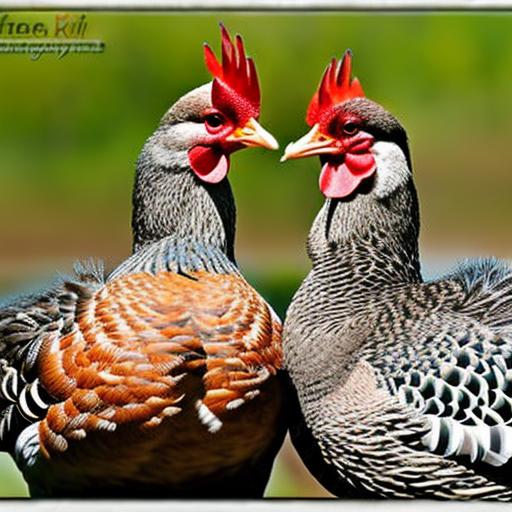Keeping chickens and geese together can be a rewarding experience for poultry enthusiasts. Both birds have their own unique characteristics and benefits, and understanding their compatibility is crucial for a successful cohabitation. Chickens and geese can provide natural pest control, increased egg production, and companionship for each other. However, there are several factors to consider before keeping these birds together, such as space requirements, breed compatibility, and feeding requirements. By understanding the temperament of chickens and geese, providing adequate space, and meeting their specific dietary needs, you can create a harmonious environment for both species.
Key Takeaways
- Chickens and geese can be compatible and beneficial to keep together.
- Consider factors such as breed, size, and space before keeping chickens and geese together.
- Chickens and geese have different temperaments and require adequate space to coexist peacefully.
- Proper feeding and health management are important when keeping chickens and geese together.
- Common behavioral issues can be addressed with proper management and attention.
The Benefits of Keeping Chickens and Geese Together
One of the main benefits of keeping chickens and geese together is natural pest control. Geese are known to be excellent grazers and can help keep your yard or pasture free from weeds and insects. They have a keen eye for spotting pests and will eagerly consume them. Chickens also contribute to pest control by scratching the ground and eating insects, larvae, and other small pests. By combining the foraging abilities of both birds, you can effectively reduce the presence of pests in your outdoor space.
Another advantage of keeping chickens and geese together is increased egg production. Chickens are known for their ability to lay eggs regularly, while geese are known for their larger eggs with a rich flavor. By having both species in your flock, you can enjoy a variety of eggs for your culinary needs. Additionally, geese are known to be excellent guardians of their nests and will fiercely protect their eggs from predators. This can help ensure a higher hatch rate if you decide to breed your birds.
Companionship is also an important benefit of keeping chickens and geese together. Both species are social animals that thrive in the company of others. Chickens are known to form strong bonds with their flock mates, while geese are highly loyal and protective of their companions. By providing a mixed flock, you can create a harmonious environment where the birds can interact and provide companionship for each other.
Factors to Consider Before Keeping Chickens and Geese Together
Before introducing chickens and geese to the same living space, there are several factors to consider. First, you need to ensure that you have enough space to accommodate both species. Chickens require a minimum of 4 square feet per bird in the coop and 10 square feet per bird in the outdoor run. Geese, on the other hand, need more space due to their larger size and grazing habits. They require at least 20 square feet per bird in the coop and 100 square feet per bird in the outdoor area.
Breed compatibility is another important factor to consider. Some chicken breeds may be more compatible with geese than others. It is best to choose chicken breeds that are known for their calm and docile temperament, as aggressive chickens may not get along well with geese. Additionally, some goose breeds may be more tolerant of chickens than others. It is important to research and choose breeds that are known to cohabitate well together.
Feeding requirements also need to be taken into consideration. Chickens and geese have different dietary needs, and it is important to provide a balanced diet for both species. Chickens require a diet that is high in protein, while geese require a diet that is high in fiber. It is best to provide separate feeding areas for each species to ensure that they are getting the appropriate nutrients.
Understanding the Temperament of Chickens and Geese
Chickens and geese have different behaviors and temperaments that need to be understood before introducing them to each other. Chickens are generally more social and docile, while geese can be more territorial and protective. It is important to introduce new birds to the flock gradually to minimize stress and aggression.
When introducing new birds, it is best to do so during the daytime when there is plenty of light. This will allow the birds to see each other clearly and reduce the chances of aggression. It is also important to provide plenty of hiding spots and perches for the birds to escape to if they feel threatened. This will help reduce stress and prevent injuries.
The Importance of Providing Adequate Space for Chickens and Geese
Providing adequate space for chickens and geese is crucial for their overall health and well-being. Chickens require a minimum amount of space to move around, stretch their wings, and engage in natural behaviors such as scratching and dust bathing. Geese, on the other hand, require more space due to their larger size and grazing habits.
Providing more space for your birds has several benefits. It allows them to exercise and engage in natural behaviors, which promotes physical and mental well-being. It also reduces the chances of aggression and territorial behavior, as the birds have more room to establish their own territories. Additionally, providing more space can help prevent the spread of diseases and parasites, as overcrowding can increase the risk of transmission.
When creating a living space for chickens and geese, it is important to consider their specific needs. The coop should be well-ventilated, secure from predators, and provide enough roosting space for both species. The outdoor run should be fenced in to prevent escape and provide ample grazing area for geese. It is also important to provide shelter from extreme weather conditions, such as shade during hot summer months and protection from wind and rain.
Feeding Requirements for Chickens and Geese

Chickens and geese have different dietary needs that need to be met in order to keep them healthy. Chickens require a diet that is high in protein, which can be provided through a balanced commercial feed or a combination of grains, seeds, and insects. They also require access to fresh water at all times.
Geese, on the other hand, require a diet that is high in fiber. They are grazers by nature and need access to fresh grass and other vegetation. It is important to provide a grazing area for geese where they can freely roam and forage. Additionally, geese can be supplemented with a commercial waterfowl feed or grains such as corn and wheat.
It is important to provide separate feeding areas for chickens and geese to ensure that they are getting the appropriate nutrients. This will also help prevent aggression and competition over food. It is also important to monitor their feeding habits and adjust their diet accordingly. For example, during the winter months when fresh grass is not available, geese may require additional supplementation with greens or hay.
Health Concerns When Keeping Chickens and Geese Together
When keeping chickens and geese together, it is important to be aware of common diseases and illnesses that can affect both species. Some diseases can be transmitted between chickens and geese, so it is important to practice good biosecurity measures to prevent the spread of disease.
Common diseases that can affect both chickens and geese include respiratory infections, parasites such as mites and lice, and viral infections such as avian influenza. It is important to monitor your birds for any signs of illness, such as coughing, sneezing, lethargy, or changes in appetite or behavior. If you suspect that your birds are sick, it is best to consult with a veterinarian who specializes in poultry health.
Preventing and treating health issues in chickens and geese involves good hygiene practices, such as regular cleaning of the coop and providing clean water and feed. It is also important to quarantine new birds before introducing them to the flock to prevent the spread of disease. Additionally, providing a balanced diet, regular exercise, and access to fresh air and sunlight can help boost the immune system and prevent illness.
Managing the Flock: Tips for Keeping Chickens and Geese Together
Managing a mixed flock of chickens and geese requires careful observation and attention to their behavior and needs. It is important to maintain a healthy and happy flock by providing a safe and comfortable environment.
One tip for managing aggression and territorial behavior is to provide plenty of hiding spots and perches for the birds to escape to if they feel threatened. This will help reduce stress and prevent injuries. It is also important to monitor the flock for any signs of aggression or bullying, such as pecking or chasing. If aggression becomes a problem, it may be necessary to separate the birds temporarily or provide additional space.
Regular observation of the flock is also important for identifying any signs of illness or injury. By monitoring their behavior, appetite, and overall appearance, you can quickly identify any issues and take appropriate action. It is also important to provide regular veterinary care, such as vaccinations and deworming, to keep your birds healthy.
Common Behavioral Issues and How to Address Them
When keeping chickens and geese together, there are some common behavioral issues that may arise. One issue is egg stealing, where chickens may steal eggs laid by geese or vice versa. To address this issue, it is best to provide separate nesting areas for each species. This will help prevent competition over nesting sites and reduce the chances of egg stealing.
Bullying can also be a problem in mixed flocks. Chickens may peck or chase geese, or vice versa. To address this issue, it is important to provide plenty of space and hiding spots for the birds to escape to if they feel threatened. It may also be necessary to separate the birds temporarily if aggression becomes a persistent problem.
To prevent these behavioral issues from occurring, it is important to provide a balanced and stimulating environment for your birds. This includes providing plenty of space, perches, and hiding spots, as well as access to fresh air, sunlight, and natural foraging opportunities. By meeting their physical and mental needs, you can help prevent boredom and reduce the chances of behavioral issues.
The Joys of Keeping Chickens and Geese Together
Keeping chickens and geese together can be a rewarding experience for poultry enthusiasts. By understanding their compatibility, providing adequate space, and meeting their specific dietary needs, you can create a harmonious environment for both species. The benefits of keeping chickens and geese together include natural pest control, increased egg production, and companionship for both birds. While there are some factors to consider and potential behavioral issues to address, the joys of raising chickens and geese together far outweigh the challenges. So why not give it a try and enjoy the many benefits of keeping these birds together?
If you’re considering keeping chickens and geese together, it’s important to understand the dynamics between these two species. While they can coexist harmoniously, there are certain factors to consider. In a recent article by Poultry Wizard, they discuss the compatibility of chickens and geese in a shared coop. The article provides valuable insights into the benefits and challenges of keeping these birds together, as well as tips on creating a suitable living environment for both species. To learn more about this topic, check out the article here.
Meet Walter, the feathered-friend fanatic of Florida! Nestled in the sunshine state, Walter struts through life with his feathered companions, clucking his way to happiness. With a coop that’s fancier than a five-star hotel, he’s the Don Juan of the chicken world. When he’s not teaching his hens to do the cha-cha, you’ll find him in a heated debate with his prized rooster, Sir Clucks-a-Lot. Walter’s poultry passion is no yolk; he’s the sunny-side-up guy you never knew you needed in your flock of friends!







